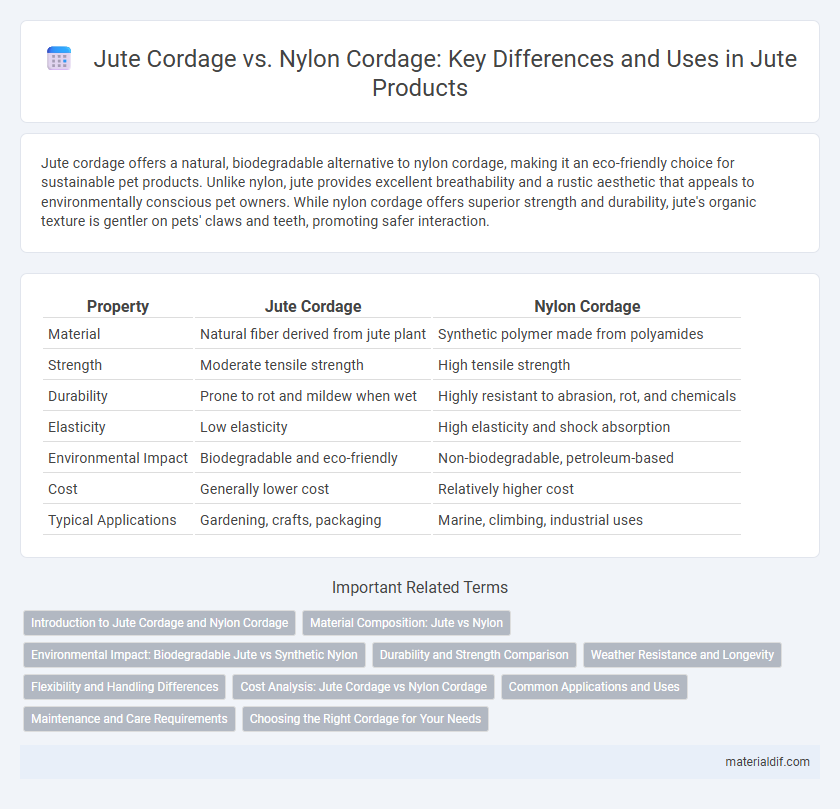Jute cordage offers a natural, biodegradable alternative to nylon cordage, making it an eco-friendly choice for sustainable pet products. Unlike nylon, jute provides excellent breathability and a rustic aesthetic that appeals to environmentally conscious pet owners. While nylon cordage offers superior strength and durability, jute's organic texture is gentler on pets' claws and teeth, promoting safer interaction.
Table of Comparison
| Property | Jute Cordage | Nylon Cordage |
|---|---|---|
| Material | Natural fiber derived from jute plant | Synthetic polymer made from polyamides |
| Strength | Moderate tensile strength | High tensile strength |
| Durability | Prone to rot and mildew when wet | Highly resistant to abrasion, rot, and chemicals |
| Elasticity | Low elasticity | High elasticity and shock absorption |
| Environmental Impact | Biodegradable and eco-friendly | Non-biodegradable, petroleum-based |
| Cost | Generally lower cost | Relatively higher cost |
| Typical Applications | Gardening, crafts, packaging | Marine, climbing, industrial uses |
Introduction to Jute Cordage and Nylon Cordage
Jute cordage is a natural fiber product derived from the jute plant, known for its eco-friendly, biodegradable properties and strong tensile strength, making it ideal for sustainable packaging and agricultural uses. Nylon cordage, crafted from synthetic polyamide fibers, offers superior durability, resistance to abrasion, and high elasticity, commonly used in heavy-duty applications and marine environments. Comparing both, jute cordage excels in environmental sustainability, while nylon cordage provides enhanced performance under tension and exposure to harsh conditions.
Material Composition: Jute vs Nylon
Jute cordage is made from natural plant fibers derived from the jute plant, offering biodegradability and eco-friendliness. Nylon cordage consists of synthetic polyamide polymers, providing superior strength, elasticity, and resistance to abrasion and chemicals. The material composition dictates durability, environmental impact, and ideal usage conditions, with jute suited for sustainable applications and nylon favored for heavy-duty, long-lasting performance.
Environmental Impact: Biodegradable Jute vs Synthetic Nylon
Jute cordage stands out for its environmental benefits due to its biodegradability and natural composition, breaking down quickly without releasing harmful microplastics. In contrast, nylon cordage, made from synthetic polymers, persists in ecosystems for decades, contributing to plastic pollution and harming marine and terrestrial wildlife. Choosing jute cordage supports sustainable practices by reducing long-term environmental impact and promoting eco-friendly resource use.
Durability and Strength Comparison
Jute cordage offers moderate strength and biodegradability, making it suitable for lightweight applications where environmental impact is a priority, but it degrades faster when exposed to moisture. Nylon cordage provides superior durability and tensile strength, with excellent resistance to abrasion, UV rays, and chemicals, making it ideal for heavy-duty tasks and prolonged outdoor use. The comparison highlights nylon's advantage in longevity and resilience, while jute is preferred for eco-friendly and temporary uses.
Weather Resistance and Longevity
Jute cordage offers natural biodegradability but is vulnerable to moisture, UV rays, and mildew, which significantly reduces its weather resistance and lifespan. Nylon cordage excels in resisting water, UV damage, and abrasion, providing superior durability and longevity in harsh outdoor conditions. Choosing nylon cordage ensures extended performance for applications exposed to variable weather, while jute is better suited for short-term or indoor uses.
Flexibility and Handling Differences
Jute cordage offers natural flexibility with a softer texture, making it easier to handle and knot securely, especially in applications requiring gentle grip. Nylon cordage, while less pliable, provides higher tensile strength and elasticity, allowing it to stretch under load without snapping. The choice between jute and nylon cordage depends on whether flexibility and ease of handling or strength and durability are prioritized.
Cost Analysis: Jute Cordage vs Nylon Cordage
Jute cordage generally costs significantly less than nylon cordage due to its natural fiber composition and lower manufacturing expenses. While nylon cordage offers superior strength and durability, its synthetic production process results in higher market prices. For budget-sensitive applications, jute cordage presents a cost-effective alternative without compromising essential functionality.
Common Applications and Uses
Jute cordage is commonly used in agriculture, gardening, and crafts due to its natural biodegradability and eco-friendly properties, making it ideal for tying plants, bundling hay, and packaging. Nylon cordage finds extensive applications in marine, industrial, and outdoor activities because of its high tensile strength, durability, and resistance to moisture and abrasion, making it suitable for climbing ropes, fishing lines, and heavy-duty securing. Both materials serve unique purposes where jute excels in sustainable and disposable uses, while nylon is preferred for long-lasting and high-performance requirements.
Maintenance and Care Requirements
Jute cordage requires minimal maintenance as it is biodegradable and naturally resistant to dirt and UV damage but should be kept dry to prevent mold and rot. Nylon cordage demands more frequent care, including regular inspections for heat and abrasion damage, as its synthetic fibers can degrade under prolonged exposure to sunlight and chemicals. Proper storage in cool, dry conditions is essential for both types to maximize their durability and lifespan.
Choosing the Right Cordage for Your Needs
Jute cordage offers excellent biodegradability and natural strength, making it ideal for eco-friendly packaging, gardening, and decorative uses, while nylon cordage provides superior durability, elasticity, and resistance to abrasion and UV exposure, suitable for heavy-duty applications like marine and industrial tasks. Choose jute cordage for sustainable projects where environmental impact is a priority, and nylon cordage for demanding environments requiring long-lasting performance and high tensile strength. Assess factors such as load requirements, weather conditions, and biodegradability needs to select the most appropriate cordage material for your specific applications.
Jute Cordage vs Nylon Cordage Infographic

 materialdif.com
materialdif.com